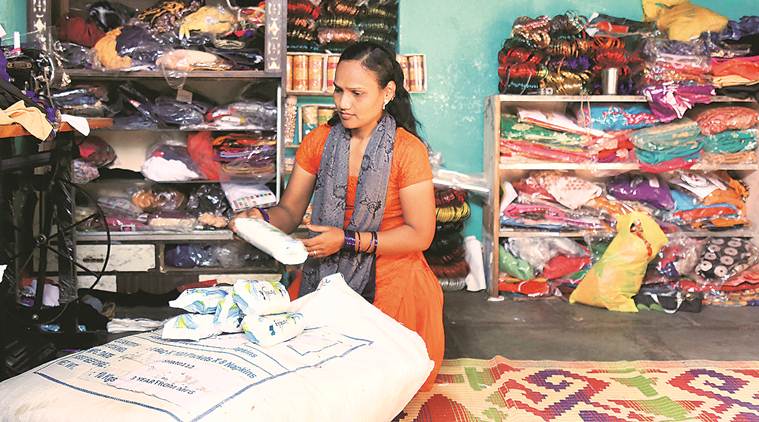 Sultana Shaikh opens a new carton of sanitary napkins, delivered at her house in Beed. (Express Photo: Nirmal Harindran)
Sultana Shaikh opens a new carton of sanitary napkins, delivered at her house in Beed. (Express Photo: Nirmal Harindran)
In Raimoha village of Beed district, Sultana Shaikh’s house is the centre of attention for shy teenage girls every time she logs in to a mobile application to place an order for a carton of 100 packets of sanitary pads. At just Rs 5 for each packet with eight pads, Sultana says the 100 packets are sold out in three days. She earns a profit of Re 1 per packet.
An initiative of the state rural department, the cheap ‘Asmita Plus’ pads, being sold through self-help groups (SHGs), have encouraged village girls to shift from cotton rags to sanitary napkins, and women like Sultana are driving that change, while also earning a livelihood. All Sultana has to do is place an order online, and the pads are delivered at her house.
Since March 2018, 2.75 lakh zilla parishad school girls have registered for this scheme under the Maharashtra State Rural Livelihood Mission. Each girl, in the 11-18 years age group, has been issued an identity card and can buy up to 13 packets in a year. Every time she buys a packet, her identity card number is fed into the mobile app.
The government pays a subsidy of Rs 19 per packet to the manufacturers. While three manufacturers — Smart Hygeia (Nagpur), Eternis Hygiene Products (Pune) and Shri Radhe Hygiene Products (Pune) — were selected earlier, the last one has since been removed for supplying inferior quality pads. SHGs can buy the packets online and sell them at the village level.
However, there is no subsidy for rural women, so the cost of the packet is higher — Rs 24, with the seller earning a profit of Rs 5 per packet.
The scheme had its share of trial and error. It was first launched in March 2018 as ‘Asmita’, but buyers complained of poor quality and absorption issues. So, hundreds of packets were left unsold at SHGs.
The Maharashtra State Rural Livelihood Mission then got extra large size, leak-proof pads with absorption capacity of 70 ml and sought feedback from its staff. The new pads, ‘Asmita Plus’, were launched in March 2019.
In less than a year, 1,879 SHGs have purchased 2,155 ‘Asmita Plus’ cartons across the state. According to the data available, 57,081 school girls have availed of the scheme so far.
“It took months for us to convince villagers that the quality is better than the previous pads,” said Shakeel Shaikh, in-charge of the scheme for Beed district. Another change this time was that SHGs could place orders on the mobile app, instead of visiting the district office to collect the packets. The government has tied up with India Post for delivery.
The next step is an ‘Asmita bazaar’, which will allow SHGs to buy grocery and sell them locally to villagers.
“We are bringing about a social change while earning some money. For years, women in our village used cloth. The pads are so good that even women are asking district officials to provide them at subsidised rates,” said Kalpana Pawar (26), who works with an SHG.
In rural Maharashtra, women order sanitary packets on app, girls buy it for Rs 5
Shaikh. Two years ago, when her husband divorced her, the 30-year-old BA graduate had no home, no job and two children to look after. Last year, she joined the Zareen Mahila Swayam Sahatya, an SHG with 10 women. Sultana was the only woman in the SHG who had knowledge of computers and mobile technology. She quickly mastered the app, and learnt how to link her bank account and make purchase orders.
“In a village, young girls feel shy to go to a pharmacy to buy pads. But they feel comfortable asking me,” said Sultana. Over the last year, following various government schemes that the Zareen Mahila Swayam Sahatya implemented, Shaikh borrowed Rs 35,000 from the SHG to open an apparel shop at her home.
“I didn’t know what a sanitary napkin was. My friend told me about this pad after she bought it,” said Bushra Shaikh (15) of Raimoha village. When she first started her menstrual cycle, she used cotton rags like her mother, A few months ago, she purchased her first packet from Sultana. She said it is so cheap that she does not feel bad asking her father, a daily wager, for money.
Her neighbour, Aisha Syed (17), said she waits for the delivery at Sultana’s home every time an order is placed. “Earlier, I bought sanitary packets for Rs 28 each from medical stores,” she said.
While the market for sanitary napkins in the state is estimated at about 2 crore women, only 34-35 lakh women currently use them. R Vimla, CEO of Maharashtra State Rural Livelihood Mission, said their aim is to reach 2 crore women in the next three years. “We are trying to make it accessible for urban women too,” she said.
Meanwhile, the SHGs have demanded a hike in their profit margin. “If the profit margin is higher, we can place more orders. All the girls in our village have started using these pads,” said Heena Pathan (28), an SHG member.